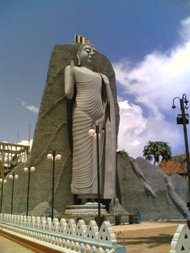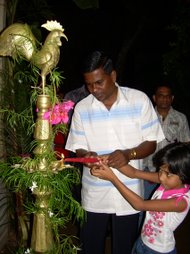Blind men and the elephant - Daily Mirror
By N Sathiya Moorthy
Old habits die hard, and Sri Lankan President Mahinda Rajapaksa cannot be blamed altogether if he continues to harp on the concept of 'unitary State' as a sure-fire way for 'power-sharing', to address the 'genuine grievances' of the Tamil community in the island-nation. By referring also to 'my own political circumstances', 'political legacy and constraints', and also to the fact that he was elected 'primarily by a Sinhala constituency', he may have made a realistic assessment of the situation in which the polity and society, particularly in the Sinhala South, finds itself.
It is true that the President, as he told an interviewer, has to carry the 'Sinhala voters with me'. But he needs to carry the Tamil population with him even more, if the political solution he proposes to the ethnic issue is to be the "outcome of a political process – an outcome that must be long-lasting and acceptable to the people".
It is a chicken-and-egg situation, and successive Governments in Colombo have never been wiser than the predecessor, either on the process, or on the political package on offer. They have variously tried out everything, addressing the Tamil concerns more than the purported reservations of the Sinhala community and polity, signed a truce accord that a section of the Sinhala polity claimed was loaded in favour of the LTTE, accepted the merger of the North and the East, as sought by the larger Tamil community, granted the LTTE a role in the P-TOMS. The list is long. Yet, none has worked – was allowed to work.
In reiterating his better-known position that any solution to the ethnic problem should be based on the 'unitary State', and relating to his election, 'primarily by a Sinhala constituency', Rajapaksa has willy-nilly referred to the presidential polls of 2005. Conversely, his UNP contender, Ranil Wickremesinghe, could be described to have contested the very same elections on a 'federal model' for power-devolution.
In a narrowly-won election, from which the LTTE forced the Tamils away, it's anybody's guess, whose mandate should apply to a final solution. This would be particularly so if the peace process ended up mainstreaming the Tamil polity and society, all over again. Still both sides to the political divide on power-devolution have a substantial following among the Sri Lankan population as a whole, and their respective concerns cannot be ignored, one way or the other.
In reiterating the suggestion for a solution based on the 'unitary State', President Rajapaksa seems to be addressing the traditional political constituency of his one-time JVP ally in particular. The JHU, which continues to be an ally of his ruling SLFP also shares a similar view, but together they may not share the same constituency. It is the SLFP, now under Rajapakse, that shares their independent constituencies with them, independent of each other, and for historic reasons, dating back to the circumstances in which the late S W R D Bandaranaike launched the party. That's where it all began, but prior to that the Tamils would charge the undivided UNP with similar designs to throttle their political existence and economic sustenance.
There is still no truth in the overwhelming Tamil perception that sees a 'great Sinhala conspiracy' in every effort that ends up delaying a political settlement to their 'historic strife'. These 'conspiracies' are in fact results of political brinkmanship among the main players in the South, and the personality clashes involving those at the helm of these affairs.
The fact however remains that the UNP successor did not correct the 'unitary character' of the First Republican Constitution while re-writing it into the Second Republican Constitution, only years later. Nor have successive governments done anything substantial to implement the corrective since applied to the 'Sinhala Only' and the 'Standardisation Law'.
Today, when President Rajapaksa is talking about an early 'southern consensus', the UNP has walked out of the APRC, citing delays and governmental insincerity. A political party, sincere to its profession of doing justice by the Tamils, would have instead walked that extra mile, to be able to guide the APRC proceedings, not boycott the same.
Clearly, the UNP is uncomfortable over some formula, acceptable to the Tamils or otherwise negotiable, emerging out of the APRC. It would require the party's attestation to the final draft for being written into the statute book. Sure enough, the Tamils ee a 'Sinhala conspiracy', which it is not.
It's not as if 'unitary States' have not devolved power equitably among its constituents, or that a 'federal State' has ensured power-devolution of the highest order. The US scheme is known to jealously protect the rights of individual States, counties and communities in matters of power-sharing, law-making and execution. It has jealously guarded the federal government's exclusive powers in matters of foreign relations, defence, and economic policy-making for the nation, even more. The differences, if any, are over the relative powers of the Executive President and federal Parliament.
The UK, considered the 'Mother of Parliamentary Democracy', does not have a 'written Constitution' as understood in terms of political jurisprudence. Yet, there have not been any complaints. If anything, the 'Irish model' of power-devolution has been among the ones stoutly argued for adoption in Sri Lanka. For a nation where the sun never used to set until not very long ago, the UK adapted itself to the swift changes of the Forties to the Sixties with grace and pace.
Then you have the 'Indian model', where neither of the 'dirty words', namely, the 'unitary State' and 'federalism' is in vogue since the nation became Independent in 1947, and a Republic not very long after, in 1950. To the traditional constitutional expert, India at the birth of the Republic was like the 'Five Blind Men of Hindoostan and the Elephant'.
Critics had thought that India was treading on an unfamiliar path and would come unstuck at the end. India has proved otherwise, and the 'dynamism' of the Indian scheme has been a factor for the successful 'Indian experience' in parliamentary democracy and power-sharing.
Suffice it is to point out that when the BJP-NDA was in power at the Centre, the Opposition had no hesitation in extending whole-hearted support to the creation of three new States, all of which were pet projects of the former while not in power. Politically too, the creation of the three new States only helped the BJP-NDA more than anyone else, but the Congress did not squirm.
The politicians and theoreticians of Sri Lankan stock, who recommend one constitutional scheme or another for adoption nearer home, have little or no exposure to any one of them, in the way a Sri Lankan should learn to look at it. If they have any experience working those schemes, if at all, they have ceased to be Sri Lankans in law and spirit.
Thus, the Sri Lankan leaders, Sinhalase and Tamils alike, look and act like the proverbial blind men. Sure enough, Sri Lanka, the 'land of elephants' remains elephantine. The elephant, too, remains to be explored.
The writer is Director, Chennai Chapter of the Observer Research Foundation (ORF), an Indian policy think-tank, headquartered in New Delhi.
"Star Lanka Online" Our NEW Web site And Web TV Channel Launched
TFGE , The Future Global Educational Center Has Launched
the official web site, called
*** Star Lanka Online Dot Com ........................
www.starlankaonline.com will be completed in very near future....
*** Star Lanka Online TV Channel,..................
Just One Click ahead ...
Now you can watch "Star Lanka Online TV" channel broadcasts from Matara, Sri Lanka in most part of the day. Still we are keeping a test transmission also. There is a link right side of your hand to watch our TV channel. You can watch (Click On the Box) live channel on this site without going to another site to watch the TV. and also recorded parts, following the below link.
the official web site, called
*** Star Lanka Online Dot Com ........................
www.starlankaonline.com will be completed in very near future....
*** Star Lanka Online TV Channel,..................
Just One Click ahead ...
Now you can watch "Star Lanka Online TV" channel broadcasts from Matara, Sri Lanka in most part of the day. Still we are keeping a test transmission also. There is a link right side of your hand to watch our TV channel. You can watch (Click On the Box) live channel on this site without going to another site to watch the TV. and also recorded parts, following the below link.
Place your Own Ad Here
Monday, September 10, 2007
Blind men and the elephant
Subscribe to:
Post Comments (Atom)





No comments:
Post a Comment